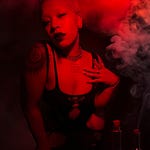Prologue
Mo has been riding with me since the beginning of me transitioning into teaching. Some of the things that we discuss are controversial— debatable; but the receipts don’t lie, those documented and the oral histories. Over the next 30 days I’ll be publishing more in support of Wasp’s Nest because there is no marketing budget for it— so I got to get it how I live. Willing this event into existence, hopefully with your support. Take a listen, use the comments to tell me what you think. You are welcome to cite and share.
Chat Notes:
(0:00 - 28:30) In the first segment Mo talks about how she came into her current pole dance practice and how a veteran stripper put her on game, positioning work as something worth considering worthy to craft. She talks about the experiential difference between being around a pole in the pole studio space and the unexplainable connection of the strip club space and her body specifically there. Her and Ashley break open a truth about geographic realities using Mo’s move from the dirty south to Los Angeles and the way the club industry presented barriers to entry that Mo did not necessarily experience in the south. Ashley and Mo then shift to ‘home’ as a space to learn, the need for privacy in the creative process and the way that Mo’s conception of practice has evolved over the years into something that is constructive.
[ These hotline conversations are prep for the first installation of Wasp’s Nest— a virtual symposium engaging the concept of ‘practice’. More information about this event can be found in these audios, while specific “what, where, why, how” info can be gained by signing up for the promotional mailer here: https://performancetempel.com/rear-end/ ]
(28:30 - 49:36) The second segment begins with Ashley leading into the next beat on spirituality and practice. Moe begins with her thoughts on her dance being a spiritual practice; along with are being a connection between a creator and their creation being a Black ancestral knowing and dance being a site of memory. Jennifer C. Nash, Ariane Cruz [sexuality study scholars] are brought into the conversation as writers who capture the complexity of pleasure and pain, speaking to the nature of practicing to pole dance and how spirituality acknowledges there are tools that keep us hopeful in horrible realities. As geographies begin to underline the conversation, Ashley switches gears with a jarring opinion about the memes that use questionable language to attribute pole dance origins to Black strippers. Ashley’s hot take leads Mo to highlighting the contributions of Black transwomen and ballroom spaces; pointing to the ways that other industries and cishet Black women who participate in entertainment and/or adult entertainment have appropriated trans fashion and beauty aesthetics, language and other significant cultural norms that originated within the trans and queer community.
(49:51 - 1:20:00) In the final segment Mo gives an interpretation and application for the term ‘geography’ in the context of human experience(s). Ashley applies the concept of geographies to the place where she practices, which is in the solitude of a bedroom but also primarily learning via virtual streaming. The two talk about the complexities of physical learning, capacity and methodology when it comes to choosing a space. Ending with thoughts on discernment, ethical care, showing up and checking yourself on when you make mistakes.
Credits & Citations
Oral histories, relatings and conversations with friends.
Allen, Jafari S. There's a disco ball between us: a theory of black gay life. Duke University Press, 2021.
Brooks, Siobhan. Unequal desires: Race and erotic capital in the stripping industry. Suny Press, 2010.
Jionde, Elexus. “A Black History of Stripper Culture.” Intelexual Media, YouTube, 24 Nov. 2023, www.youtube.com/watch?v=hnjvKhtWBC4.
McKittrick, Katherine. Demonic grounds: Black women and the cartographies of struggle. U of Minnesota Press, 2006.
Miller-Young, Mireille. A taste for brown sugar: Black women in pornography. Duke University Press, 2014.
Nash, Jennifer C. The black body in ecstasy: Reading race, reading pornography. Duke University Press, 2014.
Stallings, LaMonda Horton. "Funk the erotic: Transaesthetics and black sexual cultures." (2015).
Deleuze, Gilles, 1925-1995. Anti-Oedipus : Capitalism and Schizophrenia. Minneapolis :University of Minnesota Press, 1983.
Listen to this episode with a 7-day free trial
Subscribe to 400 Degreez Of Erotic Funk to listen to this post and get 7 days of free access to the full post archives.













